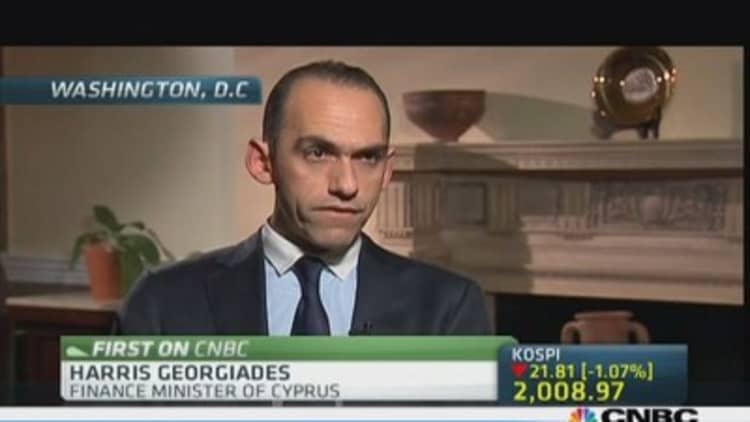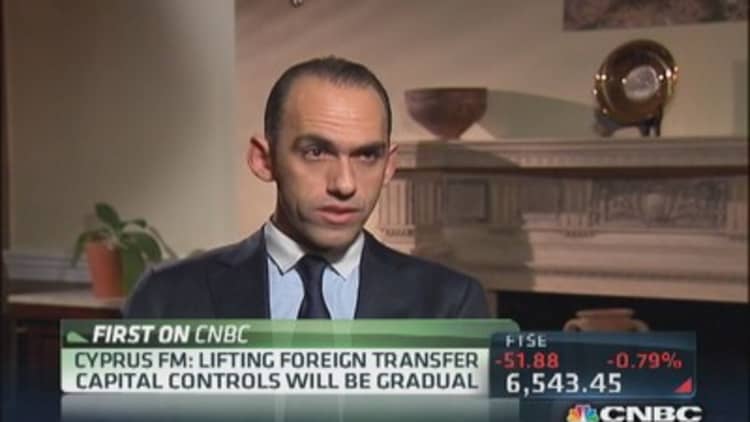
Cyprus is out of "the danger zone," Finance Minister Harris Georgiades told CNBC ahead of his meeting Tuesday with U.S. Treasury Secretary Jack Lew.
"We have come a long way since the springtime," Georgiades said, while acknowledging challenges remain. It was in March when Cyprus suffered a massive banking crisis that spread fear in financial markets around the world.
The news delivered to Lew is the story of an earlier-than-expected turnaround.
Cyprus was just upgraded by Standard & Poor's in November, about a year after its crisis erupted. Compare that to Greece, whose debt was also upgraded in November, but more than four years after its crisis started in 2009. While the so-called Troika (the European Commission, European Central Bank and the International Monetary Fund) criticized Greece's extremely slow response to requests for reforms, Cyprus received glowing assessment reports from the get go.
(Read more: S&P's Moritz Kraemer: Europe not out of the woods)
Georgiades suggested the recovery was due to Cyprus' willingness to commit and enact reforms quickly, including the recapitalization of the banking system and budget cuts. "The problem with Greece, decisions were postponed for a long time," said Georgiades, while commending current Greek Prime Minister Antonis Samaras for his work on that front.
Ultimately Georgiades credits the Cypriots themselves and the structure of the economy that makes it "a good place for business."
In the interview Monday at the Cypriot Embassy in Washington, Georgiades acknowledged one of the biggest remaining hurdles is the final elimination of capital controls, imposed during the crisis to prevent the flight of euros out of the country.
Georgiades recommitted to the elimination of most of the country's capital controls by January—with one key exception: the transfer of money outside of the country. "I'm not speculating" as to when that will happen said Georgiades. "I will obviously be reviewing the situation, but I think the gradual but steady relaxation is the correct one under the circumstances and we shall continue."
He did explain the framework under which it was likely to happen: when the recapitalization of the banking system is complete. "The stronger the confidence in the system … the easier and the sooner we shall be able to lift all the restrictions."
If capital controls are lifted before investors believe the bank is strong enough to stand on its own, depositors will flee, and in a worst-case scenario, cause a bank to collapse. That's why a complete recapitalization is a key "milestone" before the final restriction on foreign transfers is lifted, Georgiades said.
The 'bail-in'
Confidence in a bank is a psychological game as old as banking itself.
When the history of the euro zone is written, Cyprus will be remembered for a key legacy from its crisis: the bail-in. In exchange for a 10 billion euro bailout from the EU, the country agreed to "bail ins" of its banks. A bank bail-in imposes losses on a banks' shareholders, debt holders and even their large depositors before any outside capital is brought in. Shareholders for the most part lose everything. Debt holders and large depositors are given shares in the new, presumably better capitalized, bank after it receives new capital investments.
The bail-in is set to be implemented across the European Union in the event of the next crisis. The goal is to stop the use of taxpayer money for bank bailouts.
The meeting with Lew went as planned Tuesday. "The secretary welcomed progress the Cypriot government has made in implementing its reform program and made clear he looked forward to future progress. He also stressed the importance of the ongoing support from Cyprus' European partners in ensuring that the country is put on sound financial footing," a Treasury official said.

Bitcoin innovation
Cyprus most recently was in the headlines because a private university there is accepting bitcoin for tuition payments and also offering a degree in bitcoin.
"Well, it's a very exciting prospect. I have to say that personally I'm still learning regarding this bitcoin phenomenon because I think it's a very interesting phenomenon on a global scale. And it's very interesting and encouraging that a private university in Cyprus has been bold enough to take this step," said Georgiades.
Georgiades said he wasn't informed about the university's decision to accept bitcoin, but rather read it about in the news. He feels the news is emblematic of Cyprus and its economy.
"It was a private initiative and that shows how ahead the private sector, private enterprise and innovation is. And that's how it should be," he said. "I am a strong believer in the ... dynamism of the private sector and especially in Cyprus. ... Because of this entrepreneurial spirit which we have in Cyprus ... I am so confident that we shall soon be on track for recovery and growth ."
(Read more: E-gold founder backs new bitcoin rival)
—By CNBC's Michelle Caruso-Cabrera. Follow her on Twitter @MCaruso_Cabrera.


